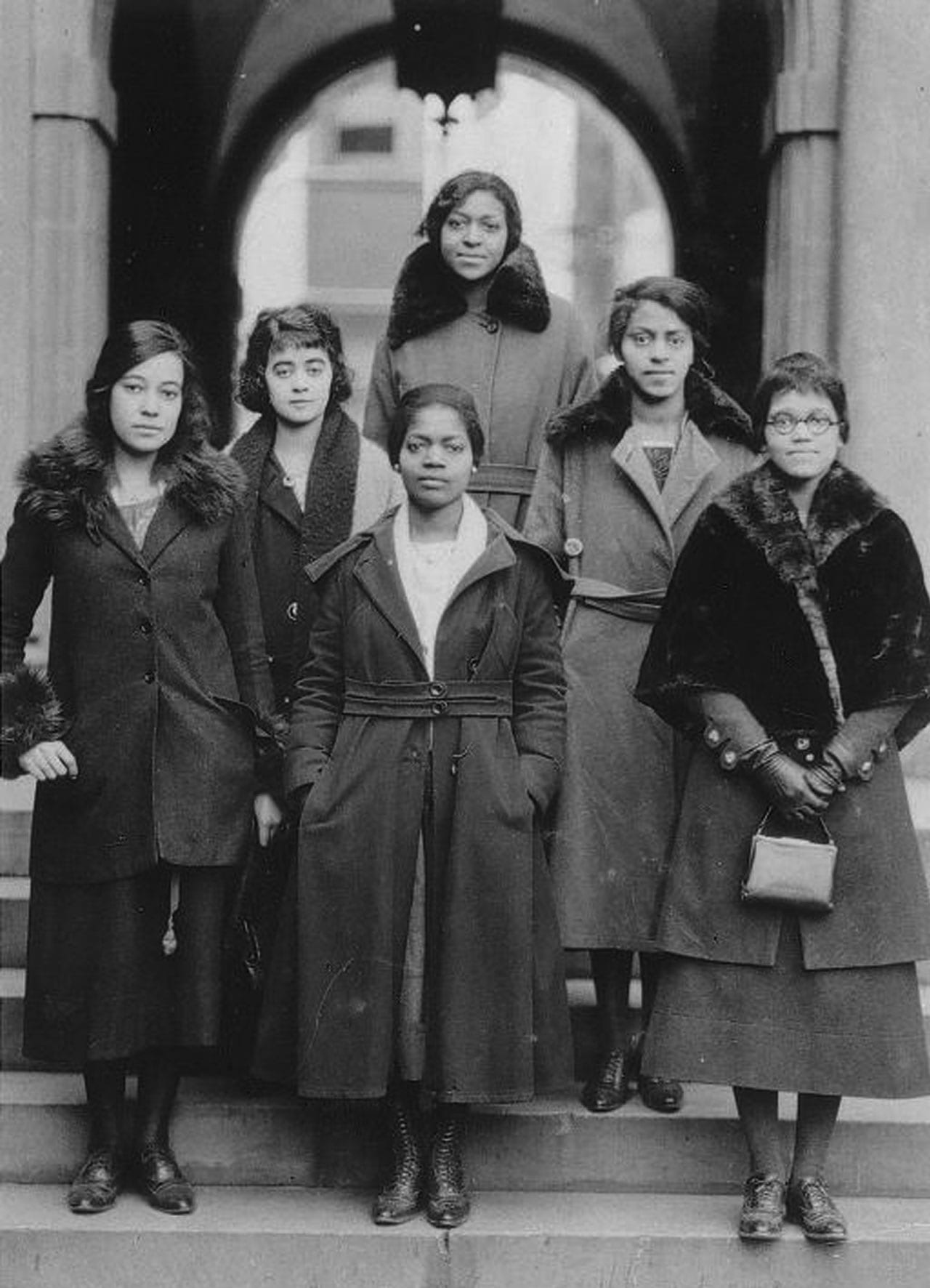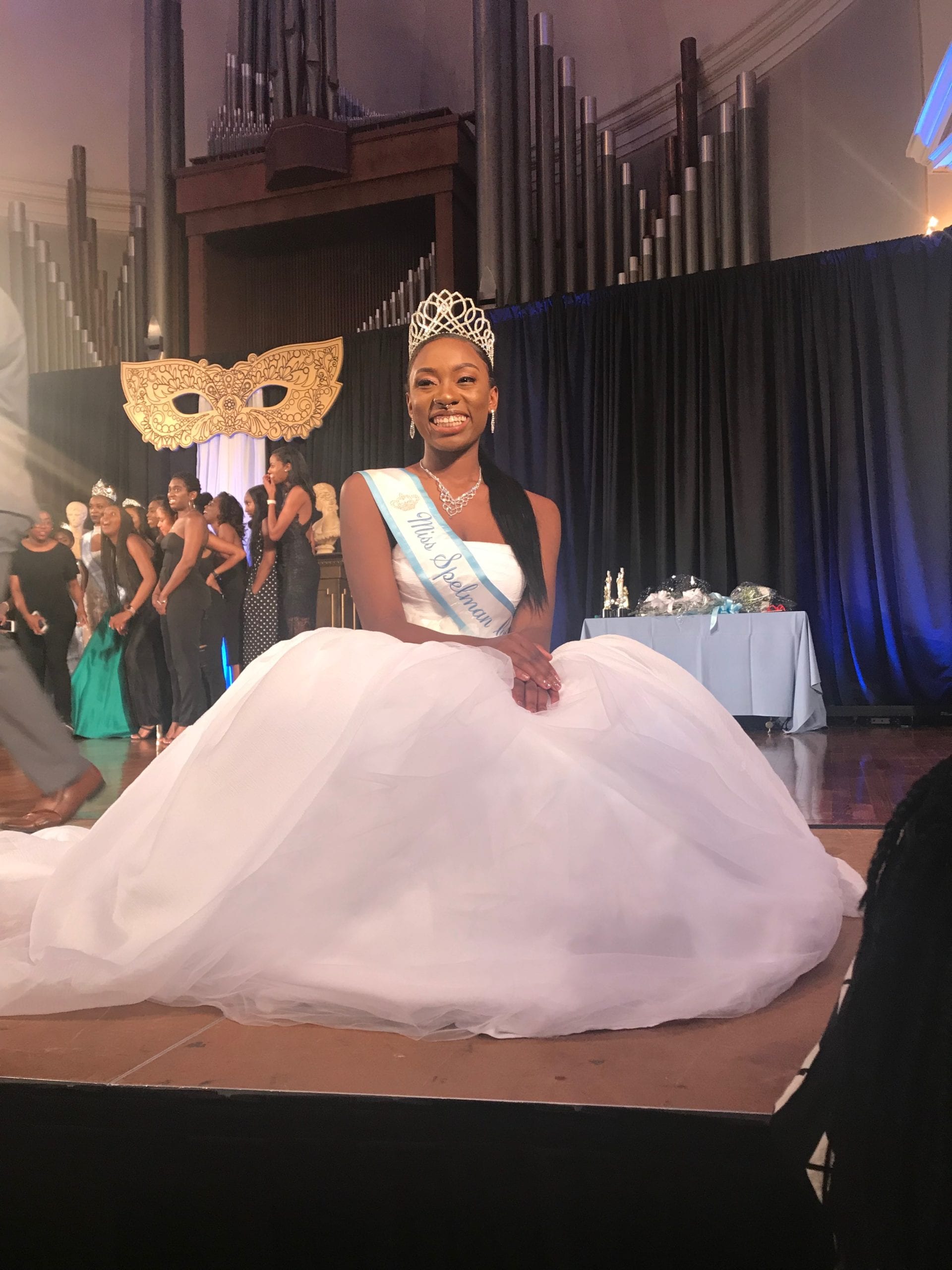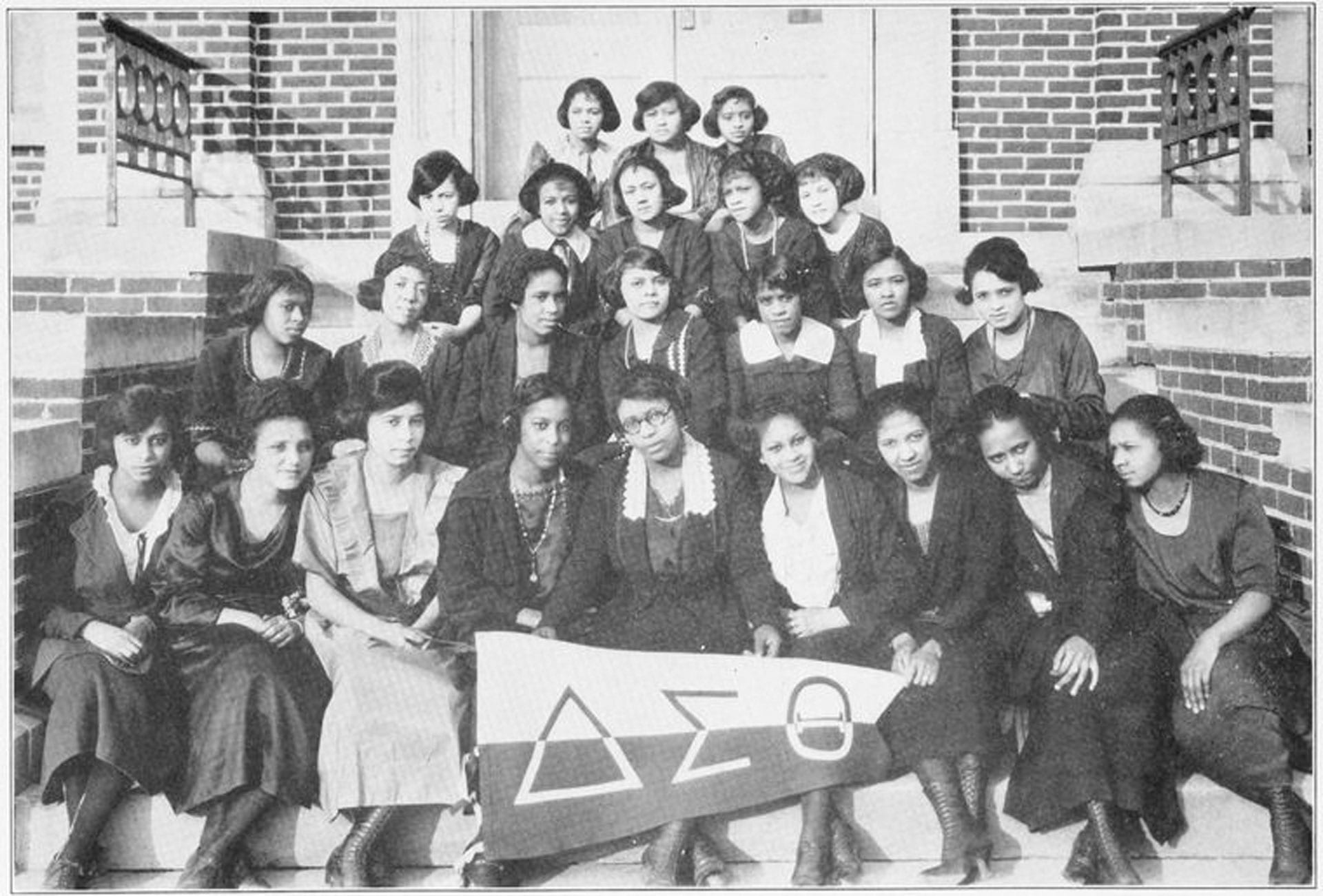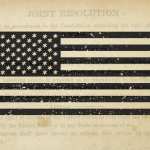On March 3, 1913, the day before President Woodrow Wilson’s inauguration, nine White women dressed in brilliant white rode down Washington, D.C.’s Pennsylvania Avenue in an official state car, representing the only states that had given women of their race the right to vote. More than three dozen White women dressed in black flanked the vehicle on foot to demonstrate how much of the nation was home to vote-less women. “No Country Can Exist Half Slave and Half Free,” the banner above them read.
The irony in 1913 was overwhelming.
The White women who organized the Woman Suffrage Procession, which attracted thousands to protest for the right to vote, advocated for a supremacist symbol of their priorities; Black women could march — but they had to bring up the rear.
Among the Black women who showed up to the parade were 22 college women from Howard University. As liberal arts students at the historically Black school in the nation’s capital, they had front row seats to the suffrage movement — and they wanted their fair share of liberation. Their college, led by a male dean noted for being unsympathetic to women’s suffrage, did not want the women to attend the march; the talk in Washington was that it was gearing up to be a contentious, and potentially dangerous, demonstration. The college eventually acquiesced and allowed the group to attend — under the terms that a man accompany them as a chaperone.
The women were excited. It would be their first public demonstration, and this particular group had recent practice advocating for themselves and their values. In the months leading up to the march, they rebelled from the nation’s first sorority for Black women, Alpha Kappa Alpha Sorority, Inc., finding it to be more of an extension of Alpha Phi Alpha Fraternity, Inc., even if just in name only, and not designed to respond to the societal issues of their time — the Great Migration, the aftermath of World War I, a thriving suffrage movement. These women needed something more than a social club.
In January 1913, two months before the women’s march, the group of 22 finalized their incorporated status and renamed themselves: Delta Sigma Theta Sorority, Inc. — delta, like the Greek letter used to denote change in mathematics — underscoring their motivations.
As the Deltas made their way to Pennsylvania Avenue, a quarter-million spectators greeted them. Bertha Campbell, valedictorian and only Black student at her Colorado high school, said the men threw things at them and yelled.
“They were saying ‘Go back to the kitchen,’ There were a lot of police and you didn’t dare step onto the sidewalk,” Campbell is quoted saying in historian Paula Giddings’ “In Search of Sisterhood,” a chronicle of the first 75 years of Delta Sigma Theta.
Florence Toms, a Washington, D.C., native with an affinity for elephants (which became the sorority’s unofficial symbol), said her family told her not to march. She defied their wishes — as the tallest of the group, she was in charge of holding the banner. With Toms, anxious but exhilarated, the Deltas joined the thousands of women demanding their voices be heard at the polls.
“It’s been very good to reexamine suffrage … to sort of understand what happened, and, of course, the resilience of Black women just to be determined to get their rights all the way through — it’s a history of great glory,” Giddings told The 19th in an interview.
Giddings, who also authored the biography “Ida: A Sword Among Lions,” says that despite myths that all other Black women marched behind the White ones, Ida B. Wells — journalist, suffragist, founder of the first Black women’s suffrage club, future member of Delta Sigma Theta and civil rights leader — famously marched with the White women of Chicago. Giddings said the group of Deltas that marched that day in D.C. rejected the racist relegation to the rear of the resistance, too.
“In that parade, the refusal to march in a segregated section was really so important,” Giddings said. “If Black women had complied with those orders to march in the back, women’s suffrage would be forever associated with white supremacy. ”

The historic moment of what was the first suffragist march in Washington was not lost on the students: Madree White, the first woman staffer at the Howard University Journal, wrote that the women’s refusal signaled to the city, the nation and the world that Deltas took a stand. Toms expected criticism, but knew the importance of them showing a united front.
“Those were the days when women were seen and not heard,” Toms said later of the moment. “However we marched that day in order that women might come into their own, because we believed that women not only needed an education, but they needed a broader horizon in which they may use that education. And the right to vote would give them that privilege.”
The suffrage march was just the beginning. The Deltas’ decision to participate was not made lightly — it was made despite heightened risk to their lives. This act of sisterhood and solidarity, laid the foundation of an institution that would endure for over a century, inducting some of the most powerful, change-making, well-known Black women throughout history, including Ida B. Wells, Marian Wright Edelman, Shirley Chisholm, Mary Church Terrell, Mary McLeod Bethune, Loretta Lynch, Cicely Tyson, Angela Bassett, Nikki Giovanni, Soledad O’Brien, Melissa Harris Perry and younger members still building their brand, like the author of this piece.
“It was emblematic of their desire to be really involved with service and civics and public issues, which sororities weren’t necessarily [involved in] so much before,” Giddings said. “So this was very kind of intentional for this to be their first act.”
In the 107 years since then, Deltas fought for suffrage and equality as Black women who would not fully gain the right to vote until 1965, and still face significant roadblocks. Like all “purposive institutions,” as Giddings called the sorority, Delta has had to find its footing as times progressed — through the Black Power years, the Civil Rights Movement and, now, the Black Lives Matter movement — while leaving room to embrace members of all political persuasions.
Delta, Alpha Kappa Alpha, Zeta Phi Beta Sorority, Inc., and Sigma Gamma Rho Sorority, Inc. are the four Black sororities in the National Pan-Hellenic Council, a nine-member collaborative for Black Greek-letter organization that’s often referred to as the Divine Nine. Each organization has become service-oriented, with less of a social focus than White fraternal organizations. And each advocated for betterment in the Black community throughout history.
It is certain that not all inductees agree with leadership’s trajectory, and this is also true of the quarter-million members of Divine Nine sororities. As the nation grapples with many questions of race and gender in the wake of a national reckoning on race and the centennial of the 19th Amendment, some want their sororities to take a more front-row approach.
“There’s a certain kind of unity that is difficult to sustain if you have a highly controversial political agenda,” Giddings said. “But it is also a reason why these organizations still exist, and will be growing, and will be around for a long time.”
In the spring of 2018, Eva Dickerson became a Delta at Spelman College, a historically Black college for women founded in 1881. Thinking back about herself as a first-year student, seeing the Deltas on campus in their leadership roles in this “world of blackness,” Dickerson, now 23, couldn’t find the words to describe what she felt at first. “Grounding,” she finally decided.
Dickerson joined the ranks of her role models when she won the prestigious Miss Spelman pageant shortly before she became a member of the sorority. However, as she got deeper into Delta, it registered that she did not always align with her sisters or the organization itself. The “starry-eyed, puppy love” she felt for Delta transitioned into an understanding that some images appear differently in the rearview.
“You get to the other side and you learn more about Delta, which is that Delta is not a monolithic organization,” she said. “It is made up of hundreds of thousands of diverse varied women and you have different experiences with each of them.”

Through the years, some members feel Delta has strayed from its roots as an organization founded in protest. In 2014, Delta issued an urgent demand for members not to display paraphernalia with the sorority’s name at protests stemming from the killing of Mike Brown in Ferguson, Missouri. Alpha Kappa Alpha asked the same of its members. Dickerson wondered what precedent that would set for the little girls.
“Ferguson didn’t just blow up because Mike Brown was murdered,” Dickerson said. “Ferguson blew up because of the extreme disenfranchisement, the segregation, the police terror. This is decades and decades, and Delta, you’re going to tell your members they can’t represent you at a protest? The sorority that was founded by protest? Oh.”
Alpha Kappa Alpha Sorority, Inc. nor Delta Sigma Theta Sorority, Inc. responded to The 19th’s request for comment.
However, during this resurgence of the Black Lives Matter movement amid the pandemic and following the police killings of George Floyd and Breonna Taylor, among others, all of the Divine Nine, as well as other Black women’s groups, signed a letter condemning violence against “Black women, Black men, Black girls, and Black boys by police and vigilantes.” Alpha Kappa Alpha provided a scholarship for Floyd’s daughters and granddaughters to attend any HBCU of their choice.
This was not the first time Delta Sigma Theta would have to reenvision itself to keep up with the times. As Giddings wrote of her sorority in “In Search of Sisterhood,” Delta’s role to transform the individual was clear, but its other roles were not always so defined.
“The role of the sorority itself in Black political life has been less clear — and in highly charged times of Black militancy, such as the sixties, it has often been thrown into a crisis of identity and relevance as a primarily social organization,” she wrote in her book.
During the Civil Rights Movement, the overwhelming political pressures and climate forced the sorority into more direct action. In the 1960s, Delta created a Student Emergency Fund, as more than a thousand chapters nationwide raised money to pay fines and bonds for those arrested during sit-ins and other demonstrations.
In Arkansas, Daisy Bates, the president of the NAACP chapter in Little Rock, Arkansas, was being terrorized for trying to integrate the schools. In the wake of her home being bombed, there was a growing consensus among younger members of Delta who wanted to be more hands-on in such issues, and Little Rock became the stage. The sorority organized fundraisers for the Little Rock Nine and Bates, providing money and direct aid as well. Eighty-three chapters of the sorority bought ad space to keep Bates’ paper, the Arkansas State Press, afloat. Bates became an honorary member of the sorority.
The sorority also raised money for a Mississippi teenager named Brenda Travis, who was arrested when she sat in a White-only area of a bus terminal as she participated in the Freedom Rides. The sorority gave more than $3,600 in aid for Travis and the 70 high school students who protested and were expelled for supporting her.
These are among the kinds of actions that inspired Dickerson as she learned about the history of the organization, and now serve as the catalyst for why she wants it to return to this style of engagement.
Dickerson says that criticizing Black organizations, particularly legacy organizations, is difficult: They’re already dealing with their own struggles, be it financial or social.
However, Dickerson believes in a constructive, if sometimes critical, dialogue out of a love for her city, her sorority, her college. “But some people can’t hold that the critique is the love, and they only feel the sharpness,” she said.
Although members of Alpha Kappa Alpha Sorority, Inc. did not attend the suffrage march as an organization, some of its most notable members have long fought for voting rights access and civil rights for more than a century. It counts Anna Julia Cooper, Coretta Scott King and her daughter Bernice King, Mae Jemison, Maya Angelou, and Rosa Parks among its members. Despite criticisms from the founders of Delta Sigma Theta, Alpha Kappa Alpha, the nation’s first sorority for Black women, has throughout history followed its mission, to be “in service of all mankind,” by supporting teachers and the hungry in the Mississippi Delta, funding job trainings for Black people and lobbying against lynching.
In these times, its most talked about member might be Sen. Kamala Harris, the first non-White woman to be on a major-party ticket. Adorned in pearls, a symbol of her sorority, Harris accepted the Democratic nomination for vice president last night during the Democratic National Convention. She enumerated all the people she considered to be her family, the one you’re born into, and the one you choose.
“Family is my beloved Alpha Kappa Alpha, our Divine Nine, and my HBCU brothers and sisters,” she said.
Family is my beloved Alpha Kappa Alpha, our Divine Nine, and my HBCU brothers and sisters.
Kamala Harris
Harris often directly thanks members of Delta Sigma Theta too, as she did last night when she cited Mary Church Terrell and Mary McCleod Bethune as examples of women who came before her. When she launched her bid for president in January 2019, she did so with a nod to Shirley Chisholm, the first Black woman elected to the U.S. Congress, the first Black candidate for a major party’s nomination for president of the United States, the first woman to run for the Democratic Party’s presidential nomination — and also a member of Delta Sigma Theta. And in an interview with The 19th, her first after becoming Biden’s running mate, she spoke of the Howard women who fought for voting rights alongside the other suffragists — the storied 22 founders of Delta Sigma Theta.
“There is a rivalry, but it’s a healthy rivalry I think,” Giddings said of modern relations between the two sororities. In her book, Giddings writes of competitions for who had the highest GPA, and other accolades.
Harris’ membership in Alpha Kappa Alpha has been referred to as her “secret weapon,” as her sorority sisters have shown up for her throughout her political career. However, sisterhood can be stratified.
Kelcy Higgins, 27, a native of Greenville, Mississippi, and a member of Alpha Kappa Alpha, had a lot of emotions hit her at once when she found out that Harris would be the vice presidential candidate for the Democratic Party.
“A lot of people will be excited and moved by this, a lot of different kinds of people will see themselves in her in this election,” Higgins said. “And that in itself is something OK to be excited about, even knowing what I know. That feels funny coming out of my mouth.”
Higgins is wrestling with the fact that Harris was not her preferred candidate, even during her presidential bid. It wasn’t that she didn’t like Harris, even if she held criticisms of Harris’ record as a prosecutor; Higgins was overwhelmed by what she called the “94 choices”, referring to the flooded, historically diverse field. But there was something else, what Higgins referred to as a “thickness” she felt that Harris would usher in by her very existence.
“The racism, the sexism, the birtherism — that is exhausting to witness,” Higgins said. “Are we sure that’s what we want? I know you can’t just avoid it and say let’s never have a Black woman candidate because the White people are going to talk about us so bad. But that’s heavy and unavoidable.’”
Higgins felt selfish for feeling this way, but validated when she saw the vitriol online. Maybe what she’s really feeling is fatigue because “it’s a pandemic and a revolution,” she said.
On the other hand, Higgins’ 55-year-old mother sent her nine consecutive texts all saying “Skee-Wee,” the sorority’s iconic call to other members, before she ever said a real word about Harris’ appointment.
Higgins understands the eruption from Black women in support of Harris, particularly those bonded by the sorority who feel a special obligation to be unequivocally supportive.
“Then again I can’t be mad at somebody for holding a different viewpoint,” Higgins said. “I think you love Black people the best when you’re also not afraid to critique them.”
Higgins said that Harris’ rise will work in the sorority’s benefit, perhaps not in terms of members paying dues, but certainly in pride. She herself is not an active member, meaning she does not pay membership dues — she’s focused on work right now. But of what she’s paid attention to, Higgins said she doesn’t feel disappointed or surprised by the sorority’s leadership, reflecting on email updates that say “just enough” but “not a whole lot either.”
“That’s OK for me,” Higgins said. “I recognize that it might not be OK for other people. Other people might expect more, more direct things, more pointed things. But I guess, like I said, I’m disconnected anyway.”
And despite their different views, Harris, her soror, is OK for Higgins, too.
“Kamala is a great example for all of us, Black and non-Black, that there is no one way to be Black,” Higgins said.
Mississippi Rep. Zakiya Summers, 37, joined Zeta Phi Beta Sorority, Inc. not long after she returned home from the University of Missouri. Members throughout history have included singer Dionne Warwick, author Zora Neale Hurston, and singer Minnie Riperton.
Summers entered her sorority through a graduate chapter based in Mendenhall, Mississippi, about 35 minutes outside of Jackson in a rural area. She finds the smaller chapter, less “messy” than some of the others in more urban areas, she said, not knowing how else to put it and remain politically correct.
“I find that in my chapter, we kind of stick to the business and we just make it happen without all of the extra,” she said.
Summers felt Zeta, and particularly the chapter she entered, was more action-oriented compared to the others. Zeta’s website said its founders believed that “sorority elitism and socializing overshadowed the real mission for progressive organizations and failed to address fully the societal mores, ills, prejudices, and poverty affecting humanity in general and the black community in particular.”
Summers also liked that she would be tethered to a network of professionals, especially because so many of her childhood friends had moved away.
“I was looking for my sisterhood, I was looking for my crew,” Summers said. “I was looking for a group that I could relate to and that could be able to share what was going on in my professional life but also in my personal life and it be all love.”

Summers’ sorority sisters have been by her side during her political campaigns, doing phone banks, giving her a platform to speak from at various community events. Beyond that, she thinks the role of a sorority is to achieve a combination of being action-oriented and supporting its members so that they can lead in their communities. Summers believes sorority members should advocate within their organizations to see that changes happen there, too.
As Summers balances the demanding work of an extended, disrupted legislative session while keeping up with the actions of the Democratic Party leading up to November, she’s been thinking about the Black women who came before her, who made it possible for her to take public office, irrespective of which organization they pledged to spend their lives supporting.
“Actually, if it wasn’t for the Deltas and the Black women, the [suffrage] movement wouldn’t have happened,” Summers said. “In the 500-foot view of it, we did benefit from it eventually, but it took so long for us to finally gain the right to vote. I think that shows that while we might not see the change right now, immediately, I think that we should feel assured that the change is going to come even if we’re not here to see it.”





